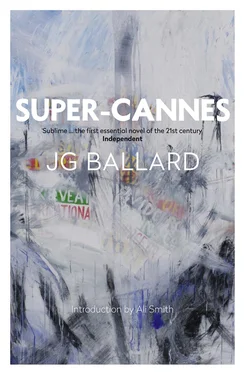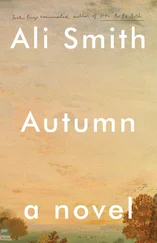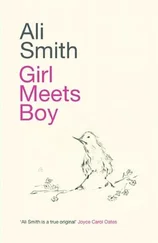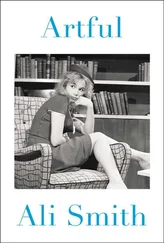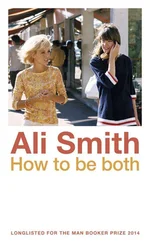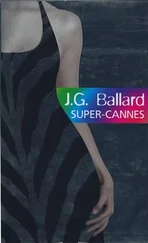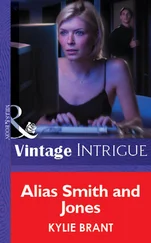Super-Cannes
J.G. BALLARD

Fourth Estate
An imprint of HarperCollins Publishers
77–85 Fulham Palace Road,
London W6 8JB
4thestate.co.uk
This edition published by Fourth Estate in 2014
First published in Great Britain by Flamingo in 2000
Copyright © J. G. Ballard 2000
The right of J. G. Ballard to be identified as the author of this work has been asserted by him in accordance with the Copyright, Design and Patents Act 1988.
Introduction © Ali Smith 2014
‘The Enormous Space’ © J. G. Ballard 1989
A catalogue record for this book is available from the British Library.
This novel is entirely a work of fiction. The names, characters and incidents portrayed in it are the work of the author’s imagination. Any resemblance to actual persons, living or dead, events or localities is entirely coincidental.
All rights reserved under International and Pan-American Copyright Conventions. By payment of the required fees, you have been granted the non-exclusive, non-transferable right to access and read the text of this e-book on-screen. No part of this text may be reproduced, transmitted, down-loaded, decompiled, reverse engineered, or stored in or introduced into any information storage and retrieval system, in any form or by any means, whether electronic or mechanical, now known or hereinafter invented, without the express written permission of HarperCollins.
HarperCollins Publishers has made every reasonable effort to ensure that any picture content and written content in this e-book has been included or removed in accordance with the contractual and technological constraints in operation at the time of publication.
Cover by Stanley Donwood
Ebook Edition © May 2013 ISBN: 9780007322183
Version: 2014-08-14
Cover
Title Page
Copyright
Author’s Note
Introduction by Ali Smith
PART I
1 Visitors to the Dream Palace
2 Dr Wilder Penrose
3 The Brainstorm
4 A Flying Accident
5 The English Girl
6 A Russian Intruder
7 Incident in a Car Park
8 The Alice Library
9 Glass Floors and White Walls
10 The Hit List
11 Thoughts of Saint-Exupéry
12 A Fast Drive to Nice Airport
13 A Decision to Stay
14 Riviera News
15 A Residential Prison
16 Widows and Memories
17 Refuge at La Bocca
18 The Street of Darkest Night
19 Elopement
20 The Grand Tour
21 Drugs and Deaths
22 The Roof Deck
23 The Confession
24 Blood Endures
25 The Cardin Foundation
26 Flying Again
27 Darkness Curves
28 Strains of Violence
29 The Therapy Programme
30 Nietzsche on the Beach
PART II
31 The Film Festival
32 A Dead Man’s Tuxedo
33 The Coast Road
34 Course Notes and a Tango
35 The Analysis
36 Confession
37 A Plan of Action
PART III
38 The High Air
39 A New Folklore
40 The Bedroom Camera
41 The Streetwalker
42 Last Assignment
‘The Enormous Space’ by J. G. Ballard
About the Author
Also by the Author
About the Publisher
A NOTE ON the local geography. Frequent visitors to the French Riviera will be familiar with Marina Baie des Anges, the vast apartment complex that lies like a second Colosseum under the Nice Airport flight path. The Pierre Cardin Foundation, at Miramar to the west of Cannes, is difficult to find but well worth a visit, and must be one of the strangest buildings in Europe. Port-la-Galère, nearby, is another architectural oddity, with its honeycomb facades worthy of Gaudi.
Antibes-les-Pins, at Golfe-Juan, is part of the high-tech Côte d’Azur that is rapidly replacing the old. An even better example, and the inspiration for Eden-Olympia, is the landscaped business park of Sophia-Antipolis, a few miles to the north of Antibes.
Super-Cannes is a luxury enclave on the heights above the Croisette, but the term might well refer to that whole terrain of science parks and autoroutes on the high ground above the Var plain. Together they make up Europe’s silicon valley, a world away from the casinos and belle époque hotels that define the Riviera of old.
Nostalgic Aviation, a cheerful museum of aircraft memorabilia, stands at the entrance to Cannes-Mandelieu Airport, and is a haven for flying buffs. On the new Riviera, even aviation is now consigned to a fondly remembered past.
J.G. Ballard
INTRODUCTION
BY ALI SMITH
‘There’s something about the novel that resists innovation,’ J. G. Ballard said. He said it more than once; it was something he was fond of saying even as he himself innovated, working away beneath and pulling up the floorboards of literary tradition, one eye on the contemporanea his novels happened to inhabit and the other on a very different clock, one ‘whose movements are virtually imperceptible but which cover giant periods of time as the human race evolved.’ Super-Cannes , which he published on the cusp not just of a new century but a new thousand years, makes inquiry into both – the time we inhabit and our place in evolutionary terms. It parallels the ancient mysteries of Eros and Thanatos alongside what’s called human progress. It rewrites (it seems literally to do this as it unfolds) the speed and expectations of English narrative while examining our warmth towards, our desire for, and the naivety and comfort in our nostalgia about, the novel form.
It’s as if he’s questioning the form’s uses to us, now, the postmodern, evolved, post-Nietzschean so-civilised human beings of the beginning of the next millennium, as he put it in an interview with John Gray:
We inhabit a house in which there are rooms that have never been unlocked, down in the basement. Now and then we’ve had a glimpse in these rooms and there are strange old cabinets and odd musical instruments. What sort of tunes do they play, one wonders, lying in the dust? … There is a darker corner of the human psyche which intrigues us, and which we feel might benefit us if we started to explore it. It’s almost a kind of murder mystery investigation. A crime happened, perhaps, or some strange event in the human past, and we are drawn to try and understand what happened.
What will happen when we go down to play in the dark of the self? What will happen when Nietzsche collides with the expectations of the super-rich exclusive-set beach-read? This: a brilliant hybrid, a glistening, riotous and deadpan piece of visionary slipstream – a brand-new kind of crime novel. Super-Cannes is the keystone of Ballard’s trilogy about gated communities, along with Cocaine Nights (1996) and Millennium People (2003), all three of which examine, via this gated microcosm, time, crime and psychopathology. It takes as its subject the liberal (seeming) nature of the giant corporations up against the truth about human instinct and human nature.
An exemplary good sort called David Greenwood has run amok, killing several work colleagues in Eden-Olympia, a science/business park plus paradisal residential complex nestling among the swimming pools in the hills above Cannes in the well-heeled south of France. Paul, an aviator who has badly damaged his knee (in a crash in a plane before it even left the ground), and his new and much younger wife, Jane – the middle-aged Paul is having what might be called a late romance – arrive in Super-Cannes from MaidaVale in their old classic Jaguar. It’s as if they’ve arrived in the future in a gorgeous clunky time-machine, ‘still locked into the past’, a past that’s ‘a huge phantom limb that aches and throbs’, so shockingly suddenly gone it’s like it’s been amputated.
Читать дальше
